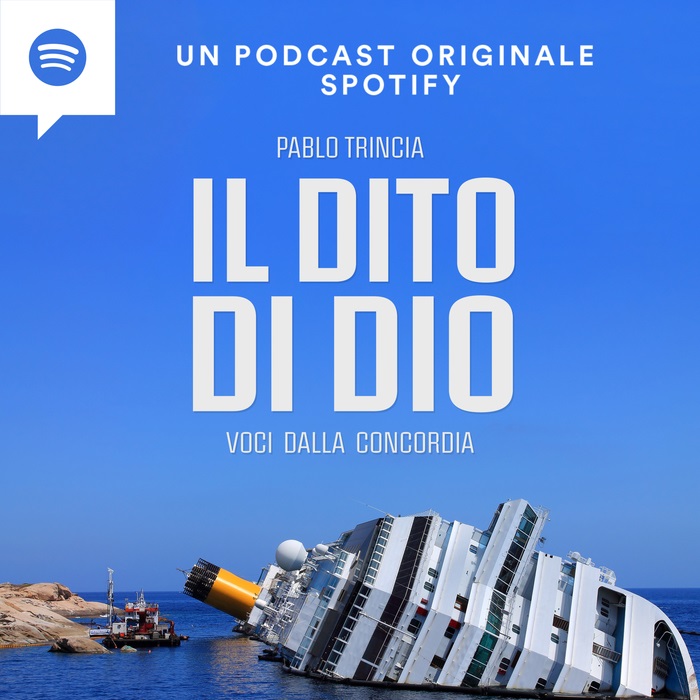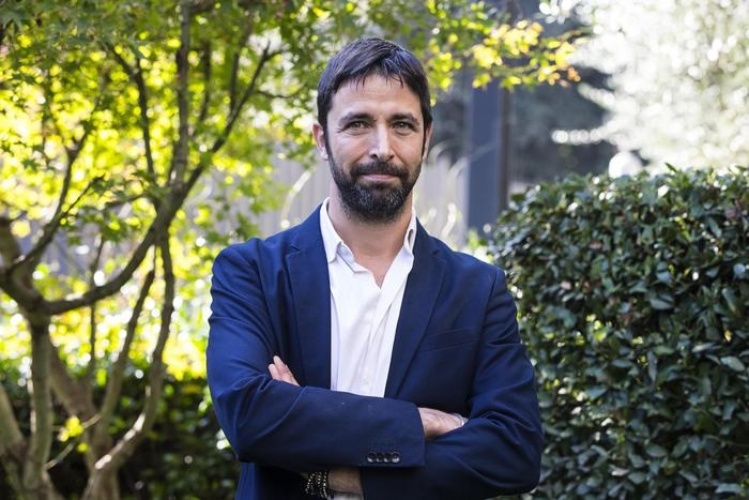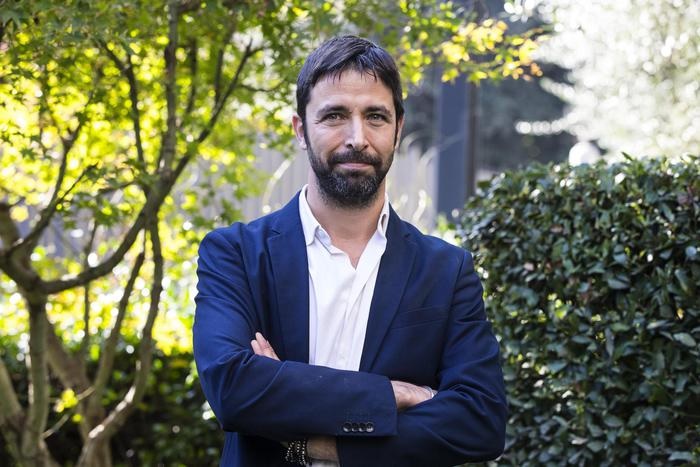Although a six-hour rescue effort brought most of the 3206 passengers and 1023 crew members ashore, 34 people died – 27 passengers, five crew, and later, two members of the salvage team.
Ten years on, Milan-based author, journalist and podcaster Pablo Trincia has ventured back in time to that fateful night to share the untold stories of those whose lives were forever changed by the events that unfolded.
The award-winning reporter has spent the past 17 years travelling in Italy and around the world to cover investigative stories for high-profile media outlets including the popular Italian TV program Le Iene, Italian newspapers Il Corriere della Sera, La Repubblica and La Stampa, and international publications Vanity Fair and Rolling Stone.
While his past work covers pressing international issues such as the Ebola crisis in Africa and the abduction of a child in an ISIS stronghold in Syria, his latest endeavour saw him return to his own backyard to create a podcast series with Chora Media, of which he is the chief author and content creator.
Entitled Il Dito di Dio – Voci dalla Concordia (The Finger of God – Voices from the Concordia), the nine-episode Spotify series transports listeners to the Costa Concordia on the night it sank and retells the story through the eyes of those involved, from passengers to crew members, rescuers and residents of Giglio.
“When I was asked to do the story for the 10th anniversary of the incident, I felt the weight of the whole ship on my shoulders for a moment,” Trincia said.
“There were over 4000 people on that ship; I had to work out who could represent the story in the best way.
“Some people had left the ship without even realising that it was going down, while others – who may have been sitting next to them at the restaurant just hours earlier – were left hanging on for their lives until 3:00 am.”
Despite Trincia’s initial concerns, the podcast has received rave reviews due its immersive and evocative nature.
“Lots of listeners have said they felt sick, disoriented or scared while listening to it,” Trincia said.
“This is what we wanted to achieve – not just an account, but a sensory experience.”
Having looked war, poverty, death and crime in the eyes many times, Trincia has witnessed and experienced every human emotion imaginable.
The talented journalist has a knack for transmitting emotions that are difficult to describe – such as pain, sorrow and remorse – to his audience and evoking a strong sense of empathy.
“I think the best thing about this job is sitting down with somebody and not just recording what they’re saying, but also sharing their experience and feeling it as well,” he said.
“Sometimes, especially with the more traumatic stories, we tend to put a barrier up to be untouched by pain or sorrow.
“I’ve done this in the past and I think it’s wrong, because you don’t really understand what someone has gone through if you can’t feel a little bit of their pain.”
While interviewing people for the podcast, Trincia was particularly touched by his encounter with Claudio Masia, a Sardinian man who was a passenger on the Costa Concordia.
Masia was with his elderly parents, wife, two children and a niece when the tragedy unfolded.
As the ship was tilting and freezing water surged through its corridors, Masia was trying to rush his family to one of the remaining available lifeboats on the lower side.
The family were holding hands to form a human chain as they moved, but when the ship suddenly jolted, Masia lost grip of his father’s hand.
His father was never seen alive again.
“I really empathised with Masia because I saw myself in him,” Trincia said.
“He was my age 10 years ago and he was at the centre of the family, generationally speaking.
“He had everyone he loved on that ship.
“As a father and a son, I thought about what must’ve gone through his mind.
“When I went to the studio to tell his story, I couldn’t read the paper in front of me; I cried for five minutes.”
Ten years on, Trincia said the incident remains an open wound for the Masia family and others affected by that night, including the rescuers who worked for days after to recover the bodies of victims.
“People have seen things that traumatised them and will remain with them forever,” he added.
However, were it not for a curious twist of fate, many more lives would have been lost.
It is this stroke of luck that inspired the name of the podcast, which was chosen by Trincia’s wife and co-writer, Debora Campanella.
“One of the people I spoke to when I started researching the story was an engineer who participated in the parbuckling operations to pull the ship upright in 2013,” Trincia said.
“While commenting on what had happened that night, he said something that fascinated me.
“When the ship hits the rocks on the island, all the engines and electrical parts died within seconds; the ship started moving right towards the open sea and that was where it would’ve sunk.
“It would’ve completely disappeared, like the Titanic, and many more people would’ve died.
“But that night, a north-east wind and the current basically pushed the ship back towards the island, where it ended up sitting on a rock, and that’s where it stayed, half-sunken.
“It was seen almost as a miracle; the engineer said he was an atheist but that it was as if God had used his finger that night to guide the ship back towards the island.”

Despite this miracle, many argue that no lives should have been lost that night and a subsequent investigation focused on shortcomings in the procedures followed by Costa Concordia’s crew and the actions of its captain, Francesco Schettino, who abandoned passengers and left the ship prematurely.
According to Trincia, the accident itself was not what proved to be fatal; rather, it was the management of the emergency and what prevailed in the hours following the collision.
“When things like that happen you have to tell the passengers that there’s an emergency, to wear their lifejackets and gather at the muster stations,” Trincia explained.
“Every passenger’s room number is associated with the number of one of the lifeboats.
“This didn’t happen; they just lied and people were left there waiting, with no information and not knowing what to do.
“That obviously created chaos and panic.”
Trincia believes a series of human errors, followed by a lack of initiative on behalf of Schettino and his crew, were the cause of the tragedy.
“I think that Schettino probably panicked and blacked out,” Trincia hypothesised.
“Imagine being him; he knew that he’d lost a half a billion dollar ship, that his career was over, that everything was over.
“He said the Costa team had told him over the phone not to call the tugboats because it would’ve cost too much, but we don’t know whether that’s true or not.
“But I think the real problem was that he blacked out and no one in his circle was ready to take over and manage the emergency.”
While Schettino has been at the centre of the story for a decade, this is precisely why Trincia decided not to interview the captain, who is currently serving 16 years in prison for manslaughter.
“I never thought to talk to Schettino because we already know everything he has to say,” Trincia said.
“When the incident happened, unfortunately the media in Italy and abroad focused on just one guy.
“No one really cared too much about the stories of the people who were on board, who could’ve been you or me.
“I think with the podcast, we managed to show people that they got just a tiny piece of the story and that there’s so much more to tell.
“During the sinking, an Indian waiter saw a girl who’d lost her shoes and – amid all the chaos – he stopped and gave her his own.
“Every human emotion came out on that ship, from courage to fear and cowardice... That’s the real story.”
Trincia’s quest to share another side of one of Italy’s darkest nights in history has seen him also write a book on the subject, entitled Romanzo di un naufragio. Costa Concordia: una storia vera.
Released this month, the book complements the podcast and allows the audience to delve into the more complex details and background stories touched on in the latter.
Trincia is optimistic that the podcast will also be turned into a television series, as has happened with his past work.
With his latest project, Trincia hopes to add meaning to a tragedy that occurred 10 years ago, but is still raw and real to so many people.
“Just to remember that there was a shipwreck doesn’t mean anything unless you know the story,” he concluded.
“That’s the message we wanted to send, that memory needs consciousness.”












